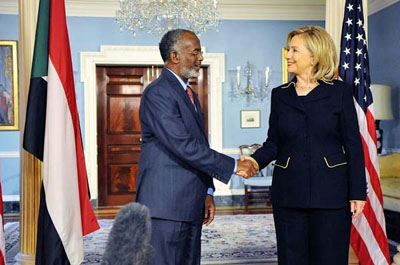
Sudanese Foreign Minister Ahmen Ali Karti’s visit to Washington D.C., carried a clear message: Sudan deserves to be removed from the state sponsor of terror list, to have sanctions dropped, and have relations normalized with the U.S. But even as the foreign minister tried to make his case in the U.S. capital, his remarks raised further doubts over the Khartoum government’s commitment to sustained peace across Sudan.
“It’s high time we turn a new page in U.S.-Sudan relations,” Karti said in his speech at the Woodrow Wilson Center on Wednesday morning, a message that was likely the crux of his meeting with Secretary of State Hillary Clinton later in the day. He argued, “[I]t is this government, often zealously casted as a pariah, that in the end possessed the political will to embark on decades-long peace process with the SPLM. It is this government that courageously embraced the right to self-determination as a viable recourse to bringing about a lasting peace.”
Of course, the referendum almost did not take place on time because of foot-dragging by Karti’s party. And though the Sudanese government does appear ready to accept the South’s overwhelming vote for secession, many more items remain on the table before the Obama administration can—and should—begin to come through on its promised incentives, at least according to the conditions laid out by the administration itself.
Post-referendum issues and the status of Abyei—items that must be addressed before Sudan’s state sponsor of terror designation is removed—will be “easy” to resolve between the two parties, according to Karti. But what would a deal look like? In response to a question about citizenship, the foreign minister said northerners and southerners could choose to live wherever they want and move freely across the border with no visas. But citizenship would not be given to southerners in the North, Karti indicated, and their political rights would be potentially denied. For the estimated 1.5 million southerners who have long lived in the North, the choice would effectively be between remaining in the place they consider home or moving to the South where they would be afforded the rights of a citizen. “You don’t need to have citizenship,” Karti said. “Maybe the political rights will be restricted. If you want to enjoy your political rights, it’s easy, you can go back to your country and contribute to voting, to any elections, or anything.”
Whether U.S. sanctions on Sudan are dropped, and relations fully normalized, depends on conditions in Darfur, a benchmark that Karti took issue with. “Normalization of relations should not be held hostage by Darfur,” the foreign minister said, arguing that the Sudanese government “has been available every time” Darfur peace talks take place. The “challenge and obstacles lie in the other side,” he said, referring to the rebels.
On the same day that Karti was giving Darfuri rebels full blame for the ongoing crisis in Darfur, the chief of the U.N.-A.U. peacekeeping mission in Darfur, or UNAMID, told the U.N. Security Council that the Sudanese government has interfered with peacekeepers 23 times in recent months. Today, UNAMID reported that the Sudanese army threatened to burn down a makeshift refugee camp and peacekeeping base and has continued to bomb a rebel base.
The Sudanese government made a difficult political decision letting the South go, but it is clearly only the beginning of a challenging period of sorting out post-referendum arrangements. The Obama administration should abide by its promises both in the sense of delivering incentives to Khartoum when it does meet benchmarks and holding firm to those benchmarks when they have not been met.
The meeting on Wednesday between Clinton and Karti also represented a symbolic step forward in Sudan-U.S. relations, one that the Obama administration should capitalize on to encourage the Sudanese government toward pluralism and inclusivity. When asked what lessons the Khartoum regime had learned from recent events in Tunisia, Karti said that the lack of freedom in Tunisia was “the reason why Tunisia broke out” and—with no hint of irony—compared the situation there to what he described as Sudan’s diverse press and ranging political parties. He said, “Everything is fine in Sudan. You cannot at all connect anything in Tunisia with anything in Sudan.”

